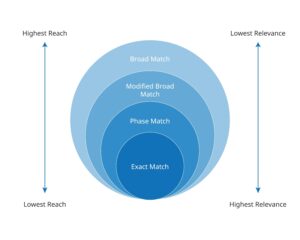How much you spend on PPC has a direct impact on how much of that ad-generated revenue you get to take home. Whereas SEO is important for your business but doesn’t necessarily require a monetary investment, when it comes to PPC you want to see a high ROI (return on investment). Even if your PPC Budget is small, there are ways you can make it go further in order to make the most of strategic ad campaigns and placements.
Keyword matches

Matching keywords to your customers’ search terms makes your ads more likely to lead to high CTR (click through rates) and conversions. These matches can be categorised as broad keywords (likely to generate more impressions), phrase keywords (which will generate more specific matches but aren’t exact) or exact matches (which will generate exact search results word for word). Depending on which keyword match type you use, they’ll produce varying results depending on phrase similarities.
Even though broad keywords do cast a wider net, you could also end up wasting your budget on clicks from an audience which doesn’t match your ICP (Ideal Customer Profile) and have no intention of buying your product or service. They could also lead to your ads overlapping each other due to their generality. If you’re only working with a small budget, your website could benefit from a mix of phase keywords and exact keywords so that the probability that a click will become a conversion is higher.
Run regular reviews
Keeping tabs on your content and your campaigns is always important, but especially if you’re on a limited budget. By reviewing which search terms are generating the most revenue, you can identify what your money is being spent on. This goes for forecasting your ads’ performance and predicted turn over as well to enable you to make smart decisions about exactly how, and on what, your budget is being spent.
You can use helpful programs like Google Keyword Planner to estimate site traffic, as well as analysing performance trends, so that you don’t blast through your budget before you’ve even reviewed how exactly your website is appealing to and attracting audiences.
A search term review is even more important at the beginning of a new ad campaign because Google pushes your ads out to test them on a wider audience before optimising the data Google crawlers collect. However, Google might be clever but it doesn’t make the distinction between terms that convert well from clicks and terms that are actually related to the product or service you’re trying to sell. That’s why it’s important to look into your search term reports.
Running regular reviews will also help you understand which search terms are less relevant and which you should exclude. By reducing the quantity of irrelevant search terms that don’t benefit your CTR, you can improve the quality of your keyword scores overall and lead to more conversions even with a smaller budget.
Pay attention to the people
Once you’ve determined who is likely to be interested in the product or service you’re presenting, you can use this information to spend wisely. Make use of target locations and demographics in order to appear on the radar of the right people.
However, when it comes to PPC, think of it like a piece of jazz music: the parts you don’t play are just as important as the ones you do. What we mean by this cryptic message is that you should make use of exclusions in order to define your customer base. Unless you’re a company like Google or Amazon who already dominate their field, your budget is likely to take a substantial cut if you just overexpose your brand and hope for the best. The smarter thing to do is to have a more refined audience who have both an interest in, and access to, your products and services.
Quality over quantity
The best way to get PPC campaigns to lead to high conversion rates is to present users with high-quality web content once they’ve interacted with the ad, and we’re not the only ones who think so! Google assesses the quality of overall user experience of your ads and landing pages.
By following a comprehensive SEO strategy alongside well-written content that follows the EEAT criteria (experience, expertise, authority, trust) and is relevant to the search term that led visitors to that webpage, you’ll not only provide a better experience for any potential customers, but this will likely reduce your cost–per-click, making your budget go further.
Optimising your landing page through trust signals like reviews, brand logos and consistent CTAs is one of the best ways you can reduce your cost per conversion by making it easier for potential customers to become your next conversion success story – and make your budget go further.
Ad assets or extensions

Adding extensions to your ads allows you the space to provide users with more information about your products and services, or makes getting in touch with you easier, encouraging higher click through rates. Extensions might include a phone number to your company, location, reviews, the prices of your products and services, or lead directly to a contact form via site links.
Due to the value of predicted impact on Google’s assessment of your ads’ rankings, adding extensions that boost user engagement also means that you’re more likely to occupy a top position on SERPs.
Right place, right time
Google’s smart bidding strategies like Target CPA (Cost Per Action), Target ROAS (Return on Ad Spend), Maximise conversion and Maximise conversion value automatically extend spends when your business is generating the highest conversions. While this is useful for audience engagement, it’s important to be aware of how you can manually adjust when and where your ads are shown as well.
If, for example, your business is open between 9 to 5 and a large part of your brand identity is speaking or meeting with clients to discuss the services you offer, it’s useful to schedule your ads to appear between these times so that users can contact you directly from your ads. This also means that you’re not paying to advertise during low search volume periods and wasting your budget on occupying a space no one is looking at at that time.
Before we “bid” you goodbye
Google Ads have a range of smart and automated bidding strategy options which you can select depending on the nature of your business and your marketing goals. Setting strategies can be a useful way to make your budget go further as they allow you to communicate goals for your ads with Google. This means Google will look to generate a specific CPA or ROI in order to improve the efficiency and effectiveness of your campaigns. These strategies include:
- Target Impression Share – this sets bids aimed at showing among top ads or as the first ad on SERPs
- Max Clicks – this focuses on getting as many clicks as possible. With this strategy the only real safeguarding you have of budget expenditure is being able to set a limit on how much you can spend on an individual click
- Maximum Conversion – this focuses on generating the highest volume of leads within a specific budget, rather than focusing on value or revenue optimisation.
When it comes to making your PPC budget go further, it really depends on the nature of your business and your marketing goals. By keeping track of action points in your Google Ads account, you’ll ensure that you’re choosing the most cost-effective methods and measuring the impact they’re having on your CTRs to lead to higher conversion rates.
FAQs
Answered by Tom McGuigan
What is the average return on investment for PPC?
It varies between industries, but Google reports that the average is around 2:1, as in you’ll make 2 pounds for every 1 pound spent.
What is classed as a limited budget?
When a campaign reaches the allocated budget for the day before the day has ended and ads stop serving before EOD, this is considered “limited”.
Does Google Ads, account for different time zones?
Not automatically, this is something you’ll have to factor in when deciding on ad schedules.
Is A/B testing carried out as two full-priced campaigns?
Not necessarily. You can do these within the same campaign and simply compare/contrast the results for the associated metrics that you’re wanting to assess performance in.
Deeper Insights:
- PPC Bidding Strategies
- 15,049 Statistics about Digital Marketing (SEO, PPC, Social Media)
- SEO vs PPC: To work together or separately?












